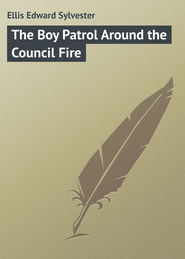По всем вопросам обращайтесь на: info@litportal.ru
(©) 2003-2024.
✖
The Boy Hunters of Kentucky
Настройки чтения
Размер шрифта
Высота строк
Поля
All this was simple enough, and when each had added several cautions to the others they silently parted company.
You will see from what has been told that there was reason to believe that George Burton, who took the direct course to the camp fire, would be the first to reach it. Indeed, the others were so confident of his doing so that they were rather indifferent to their own progress.
Feeling the responsibility on him, young George acted like an old campaigner, using more care than seemed necessary at first; but he had felt quite sure from the beginning that they were near a party of Indian warriors, and he did not mean to betray himself and friends into their hands by any lack of caution. He was glad to see, after going a short distance down the slope, that there was an increase of undergrowth. This gave him a better chance to keep his body screened while approaching the camp.
"Whatever happens," was his thought, "it shan't be said that I was the cause of Jack and Will getting into trouble. If there are a party of Indians tramping through here, it is for no good, and the best thing we can do is to get back home as quick as we know how."
At the end of a quarter of an hour he thought he must be close to the camp. Since coming down into the valley he was unable to see the smoke that was in such plain sight when they were on top of the ridge, but he used his keen eyes and sense of hearing with a skill that an Indian scout would have found hard to surpass.
"It must be close at hand-sh!"
Sure enough, he had not gone five steps farther when he came in full view of the camp.
In the middle of a small open space a number of sticks had been piled together and kindled an hour or two before. This was plain, not only from the number of burnt-out embers and brands, but from the appearance of the smoke above the trees as already described.
On a fallen tree, near the fire, sat three Indian warriors, talking together in their low guttural voices. Another was in the act of stooping down and lighting his long-stemmed pipe, while a fifth was standing a few feet away, examining his rifle-this being all that were in sight.
Each was in his war paint, and, young as was George Burton, he was certain that they were but a fraction of the party that was in the woods bent on mischief.
"They must be Wyandots," he thought, forming this opinion from the story told by Jack of his encounter that morning; "and we must get home as fast as we can, and tell the folk."
Full of this purpose, he turned softly about to hasten back, when he found himself face to face with a gigantic and scowling Indian warrior!
CHAPTER XIII.
CAPTIVE AND CAPTORS
Poor George Burton! After creeping close to the Indian camp fire, and using all the care he could, he had turned about to go back with the important news thus gained, when he found himself face to face with a gigantic warrior, who had stolen up behind him without the least noise that could betray his approach. For a moment the lad was speechless. Young as he was, he saw that he was helpless, but with a weak hope that the savage might be friendly, he said in a faint voice-
"How do you do?"
He did not reach out his hand, being afraid to do so, but he took a step to one side and forward, with the purpose of attempting to pass around the red man who had suddenly stood in his path.
It was an idle hope. The other also moved a step that placed him in front of the boy, so as to block his way.
"Howly do?" he asked, extending his brawny hand, which, it need not be said, was taken by George with much hesitation. The Indian, however, grasped and shook it without offering any injury.
The lad noticed that not only was the face of the red man hideously painted, but that his nose was awry, as though it had been slashed or broken by some frightful wound. He must have been several inches more than six feet in height, with a tremendous breadth of chest and reach of limb. He was dressed in the usual fashion of his people, and carried a tomahawk and knife in his belt.
Instead of being armed with a bow and arrow, as was Hua-awa-oma, whom Jack had spoken about, this remarkable warrior had a long fine rifle, with the necessary powder-horn and shot-pouch held by strings passing round his neck.
The first action after this greeting was an alarming one to George. Reaching out, he drew the rifle from the grasp of the lad, whose anguish was as great as that of Jack Gedney had been.
"Hoof! Yenghese brave-he go!"
The lad would not have caught the whole meaning of this but for the expressive gesture that accompanied it. The red man pointed towards the camp fire, thereby meaning that his captive should walk in that direction.
The circumstances being as they were, George did the wisest thing he could: he obeyed the order of his captor, who, had he chosen, could have smitten him to the earth with as much ease as though he were but an infant.
George, like all youngsters, was deeply interested in the accounts of frontier adventure. He had heard the hunters who sometimes stopped at his house say that the wisest course for a captive in the hands of Indians is to try to please them in every way. Any sullenness or disobedience rouses their anger, and they are quick to punish, and most likely to torment and kill, the hapless prisoner.
The agitation of George was great, but he forced himself to smile, and to say, "How do you do?" as he walked among the party, and took his seat on the log near where the three of whom I have spoken were waiting.
During the few minutes that George was allowed to sit undisturbed on the log he closely watched the faces of the Indians, and particularly of the one who had made him prisoner.
It was the ugliest countenance he had ever seen. Not only was the nose twisted out of shape, but the mouth was amazingly broad, though, like nearly all of the American race, his teeth were white and even. But his eyes were so small that they looked like beads. Around each was a white ring, while the greasy clay that served for paint was daubed over the rest of his features with an effect so hideous as to prove that the redskin was a genius in that line.
During those few minutes also the little fellow did a great deal of serious thinking.
The most natural question that he tried to answer was as to what the Indians were likely to do with him. The different tribes who roamed through the Ohio forests and Kentucky cane-fields were not famous for their kindness or mercy to their prisoners. It is well known that they often tortured them in the most shocking manner. Colonel Crawford, who commanded one of the expeditions sent into that section about the time of which I am telling you, was not only defeated, but he and many of his men were taken prisoners. Colonel Crawford was fastened to a stake driven into the ground, and burned to death with dreadful agony.
All this, not to name other similar incidents, was known to George Burton, who might well tremble for his own fate. Still he did not give up hope.
"Maybe they will think I don't amount to enough for them to bother with, and they may let me go, though I know there is no chance of ever getting my rifle back again. I am glad of one thing-they didn't catch Will or Jack."
The thought of them led George to glance behind and in front, as though he expected to see them approach. Natural as was the act on his part, it was noticed by the Wyandots (such was their tribe), who may have supposed that he expected some of his friends to come to his relief. They looked sharply at the boy, and then resumed their talk.
"We agreed," thought George, recalling their parting, "that we should all keep up the hunt until we learned what we wanted. So Jack or Will will prowl around this camp until they see what a scrape I'm in, and then, what will they do?"
Ay, what could they do?
"They'll run home and tell father," thought the captive, continuing his line of thought, "and he may set out to get me, but what can he do against all this crowd? He may go up to the settlement and bring a lot of the folk to help, but before they can come within reach of these people my fate will be settled."
There was every reason to believe that George Burton was quite right in the latter conclusion.
The conversation of the Wyandots, whatever its nature, lasted only a few minutes longer. Then the one who was occupied in filling his pipe when George first caught sight of the camp came forward, and stopped in front of him.
Most of the red men who live along the frontier soon pick up a few words of English, but it is seldom that one is seen who spoke so readily as did he who now addressed the captive. Doubtless on that account he was called upon.
"Where paleface come from?" he asked, with such a good accent that George looked up at him in surprise.
"From my home over yonder," was his prompt reply, as he pointed to the northward-the direction in which his home lay.
"What name be?"
George gave it, whereupon his questioner took several whiffs of his pipe, nodded his head several times and grunted, as if to signify that he knew all about Mr. Burton.
"Come alone?"
"I came with my brother Will and Jack Gedney."
Again the Indian indulged in several whiffs, nods, and grunts.
It was quite clear that he was in a neighbourhood with which he was familiar.
"Where be they?"
"I do not know," was the truthful reply of the lad, who, all the same, would never say anything that could endanger his friends.











